


Laozi
According to Taoism, Laozi was the incarnation of Supreme Purity. It is said that he was once a historiographer of Zhou Dynasty (c. 1100-221 BC), who resigned his post to journey westward when he saw that the dynasty was in decline. At Hangu Pass, Yin X, the commander of the pass, aware that he was a sage, asked him to write a book to teach the "Tao". Laozi wrote a two-volume book, known to later generations as Daodejing (Canon of Tao and Its Virtue). The book is the foremost Taoist scripture, with Laozi being recognized as the originator of Taoism.
Yu-huang -- The Jade Emperor
Yu-huang is the great High God of the Taoists -- the Jade Emperor. He rules Heaven as the Emperor doe Earth. All other gods must report to him. His chief function is to distribute justice, which he does through the court system of Hell where evil deeds and thoughts are punished. Yu-huang is the Lord of the living and the dead and all the gods, all the spectres and all the demons.According to legend he was the son of an emperor Ch'ing-te and his wife Pao Yueh-kuang who from his birth exhibited great compassion. When he had been a few years on the throne he abdicated and retired as a hermit spending his time dispensing medicine and knowledge of the Taoist texts. Some scholars see in this a myth of the sacred union of the sun and the moon, their son being the ruler of all Nature.
"The good who fulfill the doctrine of love, and who nourish Yu-huang with incense, flowers, candles and fruit; who praise his holy name with respect and propriety -- such people will receive thirty kinds of very wonderful rewards."--Folkways in China L Holdus.
Yuan-shih T'ien-tsun -- The First Principal
Although Yu-huang is the High God, there are other abstract deities above him. He rules; they simply exist and instruct. First and foremost is Yuan-shih T'ien-tsun - the First Principal.He has no beginning and no end. He existed "before the void and the silence, before primordial chaos." He is self-existing, changeless, limitless, invisible, contains all virtues, is present in all places and is the source of all truth.
San-ch'ing -- Three Pure Ones
These are the so-called Three Pure Ones. They are Yu-ch'ing (Jade Pure), Shang-ch'ing (Upper Pure) and T'ai-ch'ing (Great Pure). They are believed to be different manifestations of Lao Tzu. They are not rulers, but rather seek to save mankind by teaching and benevolence.
In a place with Yu-ch'ing lives Yuan-shih T'ien-tsun and the Holy Men (sheng-jen). With Shang-ch'ing lives Ling-pao T'ien-tsun (Spiritual Treasure Honoured by Heaven) and the Heroes. T'ai-ch'ing is the direct manifestation of Lao Tzu. He holds a fan, symbol of his powers, on which are written the yin-yang symbol and the Big Dipper.
San-kuan -- Three Officials
The San-kuan rule over all things in the three regions of the universe, keep a register of good and evil deeds and award good or bad fortune accordingly. T'ien-kuan, the Ruler of Heaven, grants happiness. Ti-kuan, Ruler of Earth, grants remissions of sins, and Shui-kuan, Ruler of Water, averts all evil. Their compassion for all people is unbounded. The San-kuan originated in a rite from the time of the Yellow-Turban Taoists."You, poor miserable people, ill-clad and destitute of worldly comforts, weighted down beneath the burden of labour and affliction, keep abstinence, and having taken a purifying bath, recite a thousand times the prayer in honour of the Ruler of Heaven." --Recherches sue les superstitions en Chine, Henri Dore.
San-yuan -- Three Epochs (or Principals)
The San-yuan originate from a time in the Eastern Chin Dynasty (317-420 A.D.) when the year was divided into three unequal periods. Shang- yuan ruled the first six moons (winter and spring); Hsia-yuan ruled the 7th and 8th moons (summer); and Chung-yuan ruled the 9th to 11th moons (fall). It was believed that they dwelled in the North Star (tzu-wei).
T'ien-shih
T'ien-shih was the title awarded to Chang Tao-ling (157-178 A.D.), the founder of the Yellow Turban Taoists (he is also claimed as founder by the Cheng-I and Five Bushels of Rice sects). It is believed that he received the Ling-pao (spiritual Treasure) Scripture written on golden tablets, from the Gods. He succeeded in finding the elixir of immortality, swallowed it, and ascended to Heaven, leaving his secrets, including his seals and demon-dispelling sword, with his son.Since then the title T'ien-shih has passed through the family for generations. The current (63rd) Chang T'ien-shih lives in Taiwan and heads the Five Bushels of Rice Taoist sect. He continues to retain the sword and seals of Chang Tao-ling.
Pa-hsien -- Eight Immortals
These are popular deities modeled on historical figures. They were believed to live in grottos in Heaven. They are:
Lu Tung-pin
Lu Tung-pin (755 - 805 A.D.) was a scholar, doctor and official. He became a Taoist after a long and distinguished life as an official which ended in disgrace. He was very popular in his life and after his death became venerated as the King of Medicine. He represents the wealthy and literacy.
Ts'ao Kuo-chiu
Ts'ao Kuo-chiu represents the nobility for he was connected with the Imperial Sung Dynasty. His brother committed a crime for which he was ashamed and he retired and became a hermit who studied the Tao and learned the recipe for perfection. He holds in his hands the tablet that admits one to an audience with the emperor.
One day Han Ching-li and Lu Tung-pin found him and asked him what he was doing. He replied that he was studying the Tao. "What is that and where is it?" they asked. He pointed first to the sky and then to his heart. Then they realized that he understood and they gave him the recipe for perfection.
Chang Kuo-lao
Chang Kuo-lao was once the head of the Imperial Academy but he retired to live as a hermit on Mt. Chung-t'iao in Shansi. He was summoned to court by the Empress Wu (684-705 A.D.) however, when he reached the Temple of the Jealous Woman he fell down dead. Shortly afterwards he came back to life.
He had a magic mule which could travel thousands of miles a day. When he reached his destination the mule would turn to paper and Chang Kuo-lao could fold it up and put it in his pocket. To revive it he unfolded it and spurted water on it with his mouth. He is often pictured riding the mule, facing the tail.
Li T'ieh-kuai
Li T'ieh-kuai has an iron crutch and a black face. He represents the crippled and deformed. He tries to alleviate human suffering. He was taught to be an immortal by Hsi-wang-mu, Queen of the Immortals.
One day, when his soul went to Mt. Hua he told his disciple to guard his body and cremate it after seven days if he had not returned. On the sixth day the disciple's mother fell ill and so leaving to take care of her he burnt the body a day early. Li T'ieh-kuai's soul on returning could find no body so it entered that of an old man who had just died. Only then did he discover that it was a cripple. At first he wanted to leave it but Lao Tzu persuaded him to stay and gave him a golden circlet and an iron crutch.
He carries a gourd with him in which he keeps medicine to help people. Some say that it contains the elixir of life made from the peaches of immortality that grow in Hsi-wang-mu's garden.
Ho Hsien-ku
Ho Hsien-ku is represented holding a lotus blossom (a symbol of purity) and a peach. The legend is that she lived in the time of the Empress Wu (684-705 A.D.) in the Yun-mu (Cloud Mother) Mountains.
One night she had a dream that she should grind up a stone called Yun-mu and eat it. She did and vowed chastity at the same time. She then floated from mountain peak to peak gathering fruits which she gave to her mother (she having no need to eat). The Empress heard of her and summoned her to the court but on the way she disappeared. In this way she became an immortal.
She is a patron deity of women.
Han Hsiang-tsu
Han Hsiang-tsu represents youth. He was the grand nephew of Han Yu (768- 824 A.D.) who was a minister to Emperor Hsing-tung. He is reported to have accomplished all manner of remarkable feats including the production of extraordinary plants.
He became an immortal by eating one of the peaches of immortality. He carries with him a basket of fruit or flowers.
He was a disciple of Lu Tung-pin.
Han Chung-li
Han Chung-li represents military men. He lived during the Han dynasty when he was a Marshall of the Empire. In his old age he became a hermit and lived on Yang-chiu Mt. in Shansi where he met the Five Heroes who taught him how to be an immortal. This knowledge he taught to Lu Tung-pin.
During a famine he turned base metals into silver which he distributed to the poor people. He is recognized as a figure who holds a fan or a peach.
When he achieved immortality he was carried by a stork into the Heavens. Another legend has it that the wall of his hut burst open to reveal a casket in which were instructions on how to become an immortal.
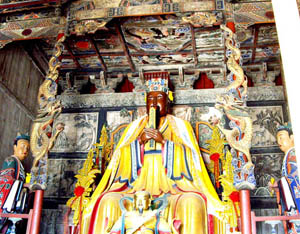 |
The Great Emperor Zhenwu, the Perfect Warrior.
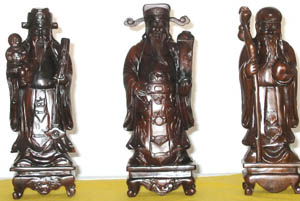 |
The Three Star-gods of Happiness, Rank and Affluence, and Longevity.
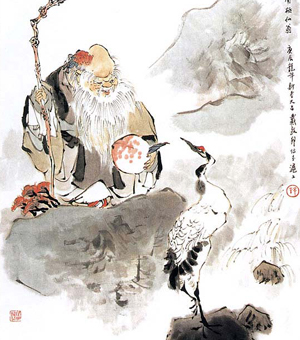 |
The Old Man of Sothern Celestial Pole
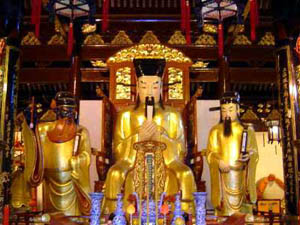 |
The God of the Town
Stellar Sovereigns of the Five Planets and Seven Stars
The Stellar Sovereigns of the Five Planets and Seven Stars are seven Taoist deities. The Five Planets are the Year Star (Jupiter), the Sparkling Deluder (Mars), the Grand White Star (Venus), the Chronographic Star (Mercury), and the Quelling Star (Saturn). Together with the sun and moon, they are also called the Seven Stars. Taoism worships the Seven Stars as spirits and calls them Stellar Sovereigns. In early ancient times, people began to worship the sun, moon and stars.
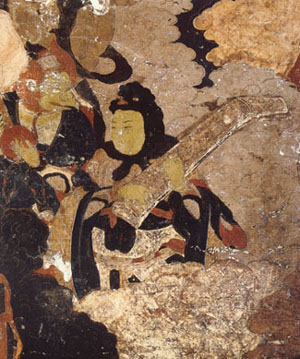 |
The Father of Thunder and the Mother of Lightning
The Father of Thunder, the spirit in charge of thunder, is called Father for it is masculine, and can also be called the Master of Thunder or the Thunder Spirit. The Mother of Lightning, the spirit in charge of lightning, is called Mother for it is feminine, and can also be called the Sacred Mother of Golden Light or Lady Lightning. The worship of thunder and lightening originated in ancient times.
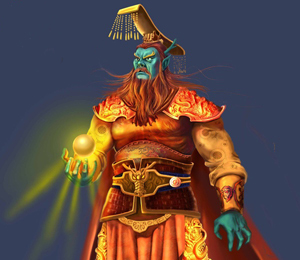 |
Dragon King
The Dragon is one of the four spirits of ancient Chinese mythology. The "Dragon Kings of the Five Emperors" each correspond to one direction; the "Dragon Kings of the Four Seas" each correspond to one sea; and the Fifty-Four Dragon Kings and Sixty-Two Divine Dragon Kings are distinguished according to all things in Heaven and on Earth.
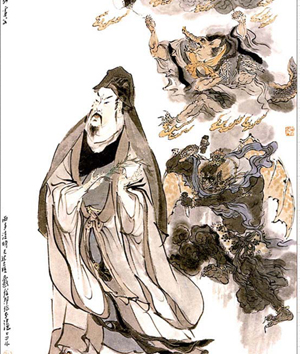 |
Master of Rain
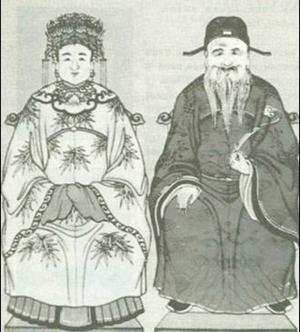 |
The Earth Spirit
In ancient China, there existed ceremonial rites of worshiping the earth and village. The village was the smallest local administrative unit.
 |
Great Emperor of Fengdu
The Great Emperor of Fengdu1 is the divinity controlling hell and the dead.
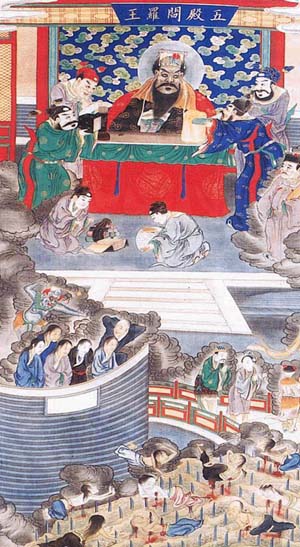 |
The Yamas of the Ten Halls
The Yamas were also known as the Kings of Hell1 or Kings of Souls.
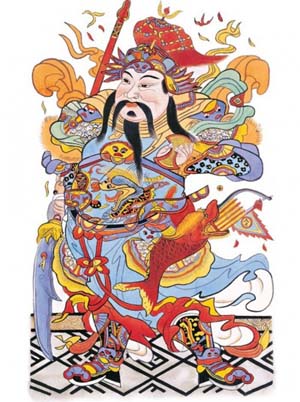 |
The Door Spirits are the spirits who guard the doors of houses.
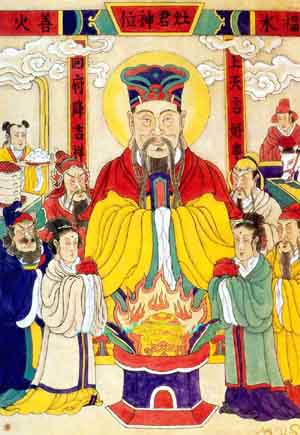 |
The Kitchen Spirit
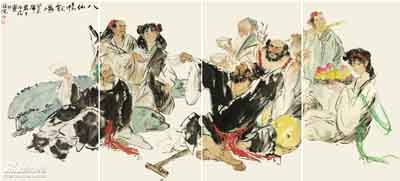 |
Eight Immortals: Zhongli Quan, Lv Dongbin, Zhang Guolao, Cao Guojiu, Li Tieguai, Han Xiangzi, Lan Caihe, and He Xiangu. They are models of achieving immortality through self-cultivation.
 |
Celestial Master Zhang
Celestial Master Zhang, or Zhang Dongling, is one of the founders of Taoist religion.
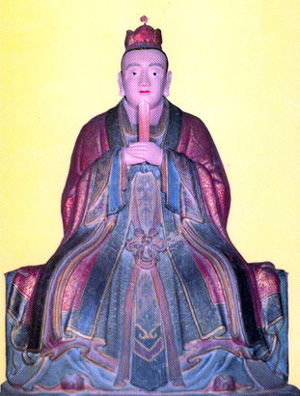 |
Perfect Man Qiu Changchun, also known as Qiu Chuji, is the founder of the Lonngmen Group of the Quanzhen Sect of Taoism.
THE ABOVE ARE JUST A BRIEF INTRO, THERE ARE MANY MORE DEITIES WHICH WE WILL TRY OUR BEST TO INTRODUCE TO YOU.










No comments:
Post a Comment